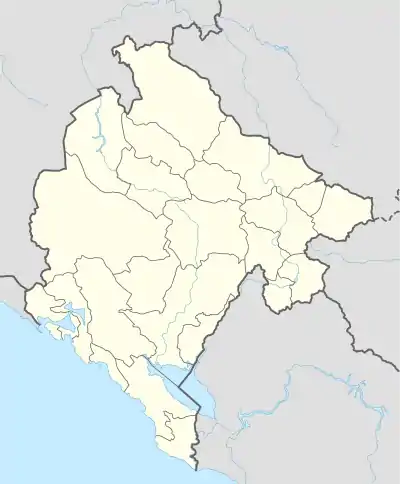Battle of Murino
The Battle of Murino took place on January 8, 1880 between the Principality of Montenegro and the League of Prizren. It was part of the battles about the sovereignty over Plav and Gusinje. According to the treaty of Berlin, the Ottoman Empire was to hand over the region to Montenegro, but this move was militarily opposed by local Albanians. At the time of the battle, it was claimed that around 10,000 Albanians from the League of Prizren fought against Montenegrin forces numbering 3,000, led by commanders Marko Miljanov and Todor Miljanov and priest Đoko, in Murino.[1]
| Battle of Murino | |||||||
|---|---|---|---|---|---|---|---|
| Part of Battles for Plav and Gusinje | |||||||
.jpg.webp) Murino in May 2011 | |||||||
| |||||||
| Belligerents | |||||||
|
|
League of Prizren | ||||||
| Commanders and leaders | |||||||
|
Marko Miljanov Todor Miljanov priest Đoko | |||||||
| Units involved | |||||||
| |||||||
 Location within modern-day Montenegro | |||||||
The battle at Murino occurred about a month later after the battle of Novšiće (December 4, 1879) as the Ottoman high command was preparing to send troops from Monastir under Ahmed Muhtar Pasha in order to pacify local resistance to the annexation. The Montenegrin forces moved from Pepići against the positions in Metej, near Plava when they were intercepted by the League of Prizren. After the skirmish, the Montenegrin forces withdrew to Sutjeska, near Andrijevica and Albanian irregulars burned down the Vasojevići settlements, Velika, Ržanica and Pepići. Both sides after the battle claimed victory.[2] In Montenegro, Prince Nicholas claimed that the defeat of the Albanians was so devastating, that Montenegrin forces finished the battle before the night had fallen, which is something they usually don't do.[3] Right after the battle of Murino, Marko Miljanov received a report that Albanians were boasting for keeping Plav and Gusinje, not for the battles they fought with the Montenegrins.[4] Some reports say that Montenegrin soldiers brought 221 noses they cut from the dead bodies of Ottoman Albanian irregulars.[5]
References
- Istorijski institut u Titogradu 1982, p. 66.
- Ippen 1916, p. 372.
- King Nikola I 1969, p. 567.
- Istorijski zapisi. Istorijski institut u Titogradu. 1982. p. 71.
Црногорци су се добро осветили за пораз на Новшићу. У томе смислу карактеристично је обавјештење које је одмах послије боја на Мурини прибавио Марко Миљанов: „Албанци се једнако хвале што су уздржали Плав и Гусиње, а што се бојева тиче које су с нама чинили, њима се ни најмање не хвале.
- Šarić, Blagoje (2005). Istorijske staze Šekulara. Pegaz. ISBN 978-86-7792-012-8.
О борбама за одбрану села Велике и бојевима на Новшићу и Мурини, односно Пепићу, Ровински је слао за лист «Руски курир» извештаје који имају велики значај као архивска грађа. Што се погинулих Арнаута тиче он наводи да су борци «донели свом командиру Тодору Миљанову 221 нос. Носеви су пребројавани и о њиховом одсецању се прича тако једноставно, као о свакој обичној ствари». Тако да прича о одсецању носева у бици на Шекулару има пуно основа.
Sources
- Vuković, Gavro; Tomović, Slobodan (1996). Memoari vojvode Gavra Vukovića. Obod. ISBN 978-86-305-0260-6.
- Dva Petrovića Njegoša: Vladika Danilo Petrović. Štamparija Petra Ćurčića. 1896.
- Istorijski institut u Titogradu (1982). Istorijski zapisi. Istorijski institut u Titogradu. p. 66.
- King Nikola I (1969). Cjelokupna djela. p. 567.
- Ippen, Theodor Anton (1916), Illyrisch-albanische forschungen (in German), München, Leipzig: Duncker & Humblot, OCLC 35691167
